- Home
- Richard Dawkins
Outgrowing God Page 10
Outgrowing God Read online
Page 10
But, you may say, it’s all very well talking about an independent set of standards. It does seem to be there, but what is it? How do we, as a matter of fact, decide what’s good and what’s bad (and therefore, incidentally, which verses of holy books are nice and which nasty)? That is the subject of the next chapter.
*Horrifyingly documented in Catherine Nixey’s book The Darkening Age (London, Macmillan, 2018).
Like all other animals, we humans are the product of hundreds of millions of years of evolution. Brains evolve like all other parts of the body. And that means that what we do, what we like doing, what feels right or wrong, also evolve. We inherit from our ancestors a liking for sweet things and a ‘yuck’ reaction to the smell of decay. We inherit evolved sexual desires. All those are easy to understand. In moderation, sugar is good for us, although too much is not. We now live in a world where too much sugar is readily available. But this was not true of our wild ancestors on the African savanna. Fruit was good for them, and many fruits contain moderate amounts of sugar. It was impossible to get too much sugar, so we evolved an open-ended appetite for it. The smell of decay is associated with dangerous bacteria. It benefited our ancestors to avoid decaying meat, and that included a revulsion to the smell. It’s obvious why we evolved a desire for the opposite sex. Sexual desire leads to babies, and those babies then carry the genes that give them sexual desires when they grow up. We are all descended from an unbroken line of ancestors who mated with a member of the opposite sex, and we have inherited their desire to do so.
But now for something less easy to understand. We seem also to have inherited a desire to be nice to other people. To be friends with them, spend time with them, cooperate with them, sympathize when they are in distress, help them when they are down. The evolutionary reason to be nice is hard to explain, and must wait until Chapter 11, after the chapters on evolution itself. Meanwhile I can only ask you to accept that niceness, of a special limited kind, is part of our evolutionary heritage, like sexual desire. And it probably feeds into our sense of right and wrong. We have evolved moral values, inherited from our remote ancestors.
And yet that can only be a part of the answer to the question that heads this chapter. This must be so, if only because our view of right and wrong changes as the centuries go by, and changes on a historical time-scale much too fast to represent evolutionary change.
You can see it as the decades go by. It’s almost like ‘something in the air’. Of course it isn’t literally in the air. It’s a combination of lots of things, so it sort of feels like ‘in the air’ because it can’t be pinned down to any one place. The dominant moral values of the twenty-first century, in which we are now living, are noticeably different from those of even a hundred years ago. They’re even more different from those that prevailed in the eighteenth century. Then, keeping slaves was simply what people did – including my ancestors in Jamaica, I’m sorry to say – and they thought civilization would collapse if the slaves were freed. The great Thomas Jefferson, third President of the United States and the main author of the US constitution, kept slaves. So did George Washington, the first President. Let’s at least hope they (and my ancestors) didn’t know the appalling conditions in the ships that transported the slaves from West Africa.
By the way, it wasn’t just white Europeans and Americans who took slaves from Africa. While Europeans were taking slaves from West Africa, Arabs were taking them from East Africa. Swahili, which has become the dominant language of equatorial East Africa, developed as the language of the Arab slave trade. It contains many words of Arabic origin. African chiefs also kept slaves themselves, as well as capturing and selling them to European and Arab traders. Not surprisingly, since the Bible’s morality was of its time, slavery is not condemned there. Even the New Testament is full of exhortations like:
Slaves, obey your earthly masters with respect and fear, and with sincerity of heart, just as you would obey Christ. Obey them not only to win their favour when their eye is on you, but like slaves of Christ, doing the will of God from your heart. (Ephesians 6: 5)
Here’s another:
All who are under the yoke of slavery should consider their masters worthy of full respect, so that God’s name and our teaching may not be slandered. (1 Timothy 6)
The revulsion against slavery which we feel today is just one example of a change ‘in the air’. Abraham Lincoln, another of America’s most revered presidents, was Charles Darwin’s exact contemporary, born the same February day in 1809. Darwin was passionately against slavery, and Lincoln actually freed the slaves in America. Yet it would not have occurred to either Darwin or Lincoln that Africans could be the equal of what they called ‘the civilized races’. Darwin’s friend Thomas Henry Huxley was an even more obviously advanced, liberal thinker. Yet in 1871 he wrote this:
No rational man, cognizant of the facts, believes that the average negro is the equal, still less the superior, of the white man. And if this be true, it is simply incredible that, when all his disabilities are removed, and our prognathous relative has a fair field and no favour, as well as no oppressor, he will be able to compete successfully with his bigger-brained and smaller-jawed rival, in a contest which is to be carried on by thoughts and not by bites. The highest places in the hierarchy of civilization will assuredly not be within the reach of our dusky cousins.
And President Lincoln said this, in 1858:
I will say, then, that I am not, nor ever have been, in favor of bringing about in any way the social and political equality of the white and black races; that I am not, nor ever have been, in favor of making voters or jurors of negroes, nor of qualifying them to hold office, nor to intermarry with white people; and I will say, in addition to this, that there is a physical difference between the white and black races which I believe will forever forbid the two races living together on terms of social and political equality. And in as much as they cannot so live, while they do remain together there must be the position of superior and inferior, and I as much as any other man am in favor of having the superior position assigned to the white race.
Truly, whatever was ‘in the air’ in the nineteenth century, something very different hovers about us today. It’s a poor historian who would condemn Lincoln and Darwin and Huxley as racists. They were as near to being non-racist as men of their time ever got. They were men of the nineteenth century. If they’d been born two centuries later they’d have been horrified by those two quotations.
You don’t even have to wait one century to notice a change in moral values. In Chapter 5 we considered the bomber crews who, on both sides, slaughtered masses of civilians in the Second World War. To start with, the bombing focused on industrial centres like Coventry in Britain and Essen in Germany, where arms were being manufactured. Bombing was inaccurate in those days, and civilian casualties were inevitable. But both sides resented their civilian deaths. They retaliated. And later in the war, the bombing raids were scaled up: civilian casualties ceased to be a byproduct and became the objective. Between 13 and 15 February 1945, 722 British and 527 US planes flattened the ancient and beautiful German city of Dresden with high explosives and fire-bombs. The exact number of civilian casualties will never be known, but realistic estimates put it at more than 100,000. That’s comparable to the figures for each of the atomic bombs that destroyed Hiroshima and Nagasaki in August 1945.
Now move on half a century. Unhappily there are still wars, but they’re nowhere near so terrible as the two world wars. In the two Gulf Wars, although there were still civilian casualties, these were treated as unfortunate mistakes. Politicians apologized for them and explained that they were ‘collateral damage’, byproducts of attacks on ‘legitimate’ military targets. It’s partly that electronic technology has advanced. Guided missiles, with satellite control and other navigation systems, can cruise accurately to a particular address keyed into their onboard computer. Very different from the indiscriminate bombi
ng of Dresden, London and Coventry. But the moral climate ‘in the air’ has moved on too. In the Second World War, people like Hitler, and Marshal of the Royal Air Force Sir Arthur ‘Bomber’ Harris, positively wanted to kill civilians. The modern equivalents of Bomber Harris (his less complimentary nickname in the RAF was ‘Butcher Harris’) go out of their way to apologize when a civilian is killed by a stray missile.
Can you believe how recently women were first allowed to vote? In Britain, women gained the same voting rights as men in 1928. Up to 1918 no women could vote, and then only those who had reached the age of 30 and met certain property and/or educational criteria. At that time men could vote at 21. The United States gave women the vote in 1920 (finally catching up with various individual states within the Union). French women couldn’t vote till 1945. And Swiss women not till 1971. As for Saudi Arabia, don’t even ask! The point is that something changes, something spreads ‘in the air’ such that, as the decades go by, the things that people find acceptable change. Dramatically quickly. Before women had the vote in Britain, nice, decent men could be heard saying things like, ‘Women are sweet and pretty and all that, but they can’t think logically. They certainly shouldn’t be allowed to vote.’ Can you imagine anyone saying that nowadays?
My friend the psychologist Steven Pinker has written a great (in both senses) book called The Better Angels of our Nature (the title is a quote from Abraham Lincoln). He shows how, over the centuries, over the millennia, we humans have been getting nicer, gentler, less violent, less cruel. The change has nothing to do with genetic evolution and nothing to do with religion. Whatever is ‘in the air’ has been moving in what we can broadly see as the same direction from century to century.
It’s the same direction, but is it the ‘right’ direction? Well, I think so and I expect you do too. Is that only because we are twenty-first-century people? I’ll leave that for you to decide. But when, in Chapter 4, we judged the God character in the Old Testament, we were judging him by the standards of our own century. Just as a good historian doesn’t look down on Abe Lincoln for his racial prejudices, so the historian might hesitate to think the worse of the God character for the truly terrible things he did. To Isaac at the hands of his father, for instance. And to Jephthah’s daughter. And to the poor Amalekites and the other tribes whose ‘land of milk and honey’ the Israelites were told to covet. The God character, in the books of the Old Testament, was only acting out the moral values that were ‘in the air’ at the time. But, although we may make allowances for his moral values (or rather the moral values of the Jews in Babylon who wrote the Old Testament), that doesn’t stop us resolving firmly to do things differently in our time. And we are entitled to oppose those fundamentalists of today who try to drag us back to those times.
Right then, moral values are ‘in the air’ and they change from century to century, even decade to decade. But, in addition to our evolutionary past, where do they actually come from? And why do they change? Partly the changes come from ordinary conversations, in cafés and in pubs and around dinner tables. We learn from each other. We hear stories about people we admire, and vow to imitate them. We read novels, or opinion pieces in newspapers, listen to podcasts or speeches on YouTube, and change our minds. Parliaments and congresses debate questions and change the law, step by step. Judges interpret the law in ways that change as the decades go by.
Before 1967, British men could go to prison for homosexual acts in private. Now, after decades of work against persistent prejudice, being gay has become normal, and gay people can claim the same respect as anyone else. It was parliamentary votes (after a long, hard struggle by the suffrage campaigners) that gave women the vote, in country after country, during the course of the twentieth century. And we may be sure members of parliament and congresses were influenced by letters they received from their constituencies and congressional districts. Decisions in courts, by judges and juries, also serve to move the climate of opinion along, as the decades go by. And we mustn’t forget academic books, and lectures in universities. Scholars who make a study of moral values, of right and wrong – moral philosophers – have an influence on the changes ‘in the air’. I’ll say a bit about moral philosophy here to round off this chapter.
There are various schools of moral philosophy. I shall talk about only two of them: absolutists and consequentialists. They take very different views of how to make moral judgements. Absolutists think some things just are right and some things just are wrong. No argument. Rightness or wrongness is just a fact, just plain true, like the statement in geometry that parallel lines never meet. An absolutist might say, ‘Killing another human being is just plain wrong. Always is, always has been, always will be.’ An absolutist of that type might say abortion is murder because an embryo is a human being. Some absolutists would even apply that argument to a fertilized egg, a single cell.
Consequentialists judge right and wrong differently. You’ll have guessed from the name that they care about the consequences of an action. For example, who suffers as a consequence of an abortion? Or who suffers as a consequence of refusing an abortion? Let’s imagine a conversation between a consequentialist (Connie) and an absolutist (Abby). It gives an idea of how moral philosophers think, and argue. Philosophers, from Plato through Hume to this day, are fond of making up dialogues between imagined arguers, and I am following their example. Notice, as we go, how quickly philosophers move from reality to ‘thought experiments’.
Abby: Thou shalt not kill another human being. A fertilized egg is a human being. Therefore abortion, even of a single fertilized egg cell, is murder. I’ve heard a woman friend say, ‘A woman has an absolute right to do what she wants with her own body. That includes the right to kill an embryo which is in her body. It’s nobody else’s business but hers.’ But the embryo is another human being. It has rights too, even though it is inside her body.
Connie: Your woman friend’s argument is an absolutist argument, like yours. She claims an ‘absolute right’ to her own body and everything inside it. That’s absolutism, although a different kind of absolutism from yours. And you and she come to opposite conclusions. But I’m a consequentialist. I ask who suffers. You can define a fertilized egg as a human being if you like. But it doesn’t have a nervous system, so it can’t suffer. It doesn’t know it’s been aborted, feels no fear or regret. A woman has a nervous system. She can suffer if she’s made to have a baby that she doesn’t want and can’t afford to look after. You and your woman friend are both absolutists. She’s a ‘women’s rights absolutist’. You are (I suspect) a religious absolutist. I agree with her conclusion, but for a different reason. Her reason is absolutist: a woman’s absolute right to control what happens in her own body. My reason is consequentialist. An embryo can’t suffer but a woman can.
Abby: Well, I agree that a single-cell embryo can’t suffer, but it has the potential to become a fully fledged human being. The abortion is depriving it of that opportunity. Wouldn’t you call that a ‘consequence’? Perhaps I’m a kind of consequentialist, too? More so than my woman friend, anyway!
Connie: Yes, I agree that depriving the embryo of future life is a consequence. But since the cell doesn’t know about it, and feels no pain or regret, why worry? Also, every time you refuse to have sex you are potentially depriving a future human being of the opportunity for a life. Had you thought of that?
Abby: At first sight, that’s not a bad point. But still, before the sperm meets the egg there’s no particular person there. By avoiding sex, you’re not depriving an individual person of existence, because there are millions of sperms and millions of potential individuals. Once a sperm is inside an egg, a particular individual person has begun. No other person. Before that moment there could be a million lives, so you can’t say you are depriving any one person of existence.
Connie: But if you talk about a fertilized egg as ‘a particular individual person’, you’re implying an indivisible entity. Do you kn
ow any identical twins? They start off as one fertilized egg. Then later they split and become two individuals. Next time you meet a pair of identical twins, why not ask them which one is the ‘person’, which one the zombie.
Abby: Hm, OK, I see what you mean. That’s an alarmingly good point. Perhaps I’d better change the subject. If all you care about is who suffers as a consequence of your actions, what’s wrong with cannibalism? I’m sure you wouldn’t kill anybody to eat them, but how about eating somebody who’s already dead and can’t suffer?
Connie: His friends and relatives would hate it. That’s a consequence! An important one. People’s feelings matter. But only those with nervous systems have feelings. A pregnant woman who desperately doesn’t want another baby has feelings. The embryo inside her doesn’t.
Abby: Sticking to my cannibalism example, suppose the dead person has no friends or relations. Nobody would suffer as a result of your eating him.
Connie: Well, now we come to what we call the ‘slippery slope’ argument. You might feel safe at the top of a precipitous hill, but if the slope down the hill is slippery and you set one foot on it, before you know what’s happened you find yourself sliding down to the bottom, where you don’t want to be. You are right that nobody would suffer if I eat an already dead person who has no friends or relations to care. That’s the top of the slippery slope. But our society has a deep and well-established taboo against cannibalism. We are revolted by the very idea. If once we break through the taboo, we are in danger of sliding down the slippery slope. Who knows where it will end? The taboo against cannibalism is useful, like a safety railing at the top of a dangerously steep slope.

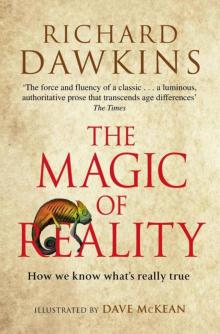 The Magic of Reality
The Magic of Reality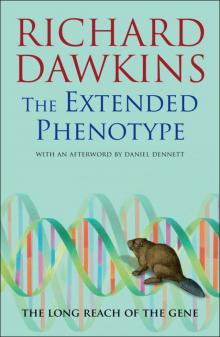 The Extended Phenotype
The Extended Phenotype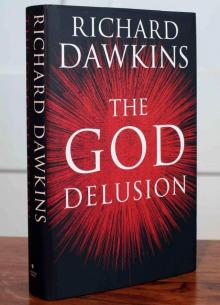 The God Delusion
The God Delusion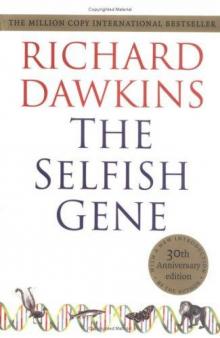 The Selfish Gene
The Selfish Gene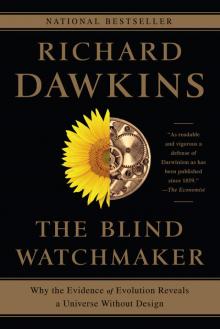 The Blind Watchmaker
The Blind Watchmaker The Greatest Show on Earth
The Greatest Show on Earth Climbing Mount Improbable
Climbing Mount Improbable Outgrowing God
Outgrowing God Brief Candle in the Dark
Brief Candle in the Dark The Greatest Show on Earth: The Evidence for Evolution
The Greatest Show on Earth: The Evidence for Evolution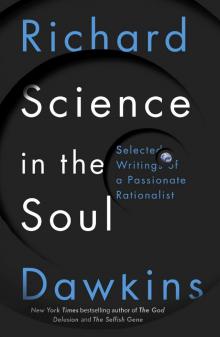 Science in the Soul
Science in the Soul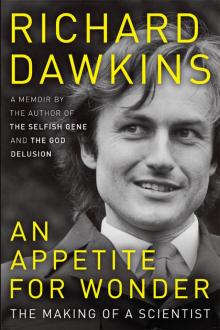 An Appetite for Wonder
An Appetite for Wonder